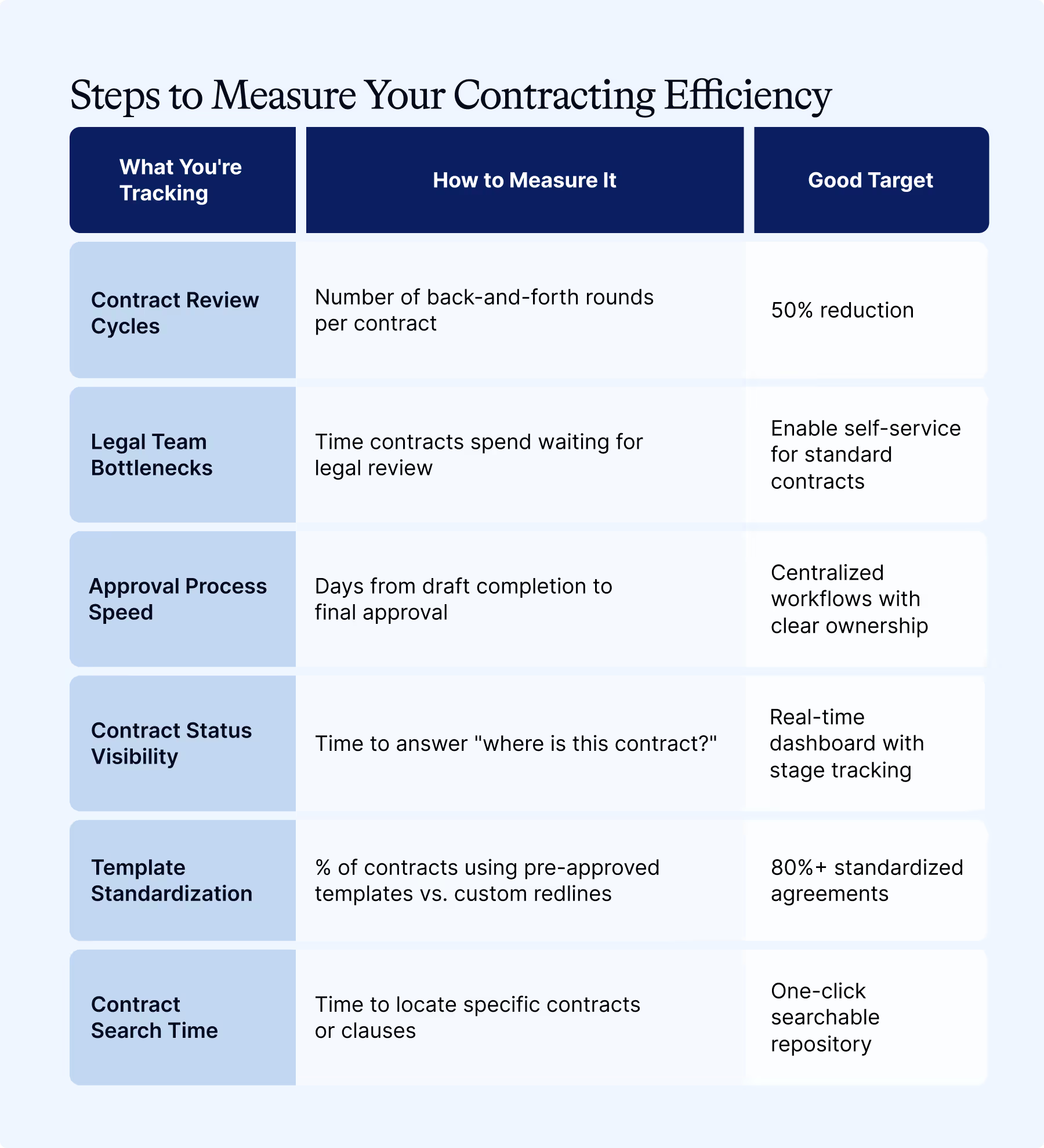It's Monday morning, and your inbox is already exploding. Three different teams need contracts "ASAP," the sales team is breathing down your neck about a deal that's been stuck in legal review for two weeks, and somewhere in the chaos, a million-dollar renewal deadline just whooshed past unnoticed.
Welcome to the world of inefficient contracting, where legal teams become the business bottleneck instead of the business enabler.
If you've ever felt like your team is constantly playing catch-up, drowning in contract requests, or firefighting delays that seem unavoidable, you're not alone. Most legal teams are stuck in processes that worked fine when they had 10 contracts a month, but fall apart completely at scale.
Why measuring contract efficiency matters
When your contracting process is inefficient, the ripple effects go way beyond just a stressed legal team. Deals get stuck in endless review cycles, causing frustrated salespeople and impatient customers. Important renewal deadlines slip through the cracks, leading to auto-renewals at unfavorable terms or scrambling to renegotiate at the last minute. Your team spends more time hunting for documents and fixing process breakdowns than actually practicing law.
How can measuring contracting efficiency impact you positively
Demonstrates clear value to leadership - When you can show concrete improvements like "we cut contract review time from 2 weeks to 3 days," everyone immediately understands the business impact and your team's contribution to organizational success.
Transforms your team's reputation - You stop being seen as the department that slows things down and start being recognized as the group that keeps business moving forward and removes friction from critical processes.
Identifies priority areas for improvement - Understanding where your bottlenecks actually occur helps you figure out what to fix first, ensuring you're investing time and resources in changes that will have the biggest impact.
Validates process improvements - Tracking progress over time lets you see if the changes you've implemented are actually working, allowing you to refine your approach and build on successful initiatives.
Enables data-driven decision making - Having concrete metrics gives you the evidence needed to justify budget requests, staffing changes, or technology investments that will further improve your contracting operations.
So, what do you measure?
Here's the thing about measuring efficiency—you don't need to track everything under the sun if you’re just starting out.
Focus on the metrics that matter to your daily work and will show clear improvement. These six measurements will give you a solid picture of how well your contract process is working:

What Happens Next?
So you've measured your efficiency and probably discovered what you suspected all along - there's room for improvement. Now what?
Start with your biggest pain point.
If contract creation is taking forever, focus on building better templates first. If finding contracts is the daily nightmare, tackle your storage and search system. Don't try to fix everything at once - pick one area and make it significantly better before moving to the next.
Once you start improving, you'll notice the effects ripple throughout your organization. Your legal team stops being seen as the bottleneck and starts being the business enabler. Sales teams get their contracts faster, which means deals close quicker. Business teams can find the information they need without constantly pinging legal. And here's the best part - your team finally has time to focus on high-value strategic work instead of drowning in administrative tasks.
The goal isn't just to work faster; it's to work smarter !
The Bottom Line
Contract efficiency isn't just about working faster—it's about working smarter. When you can find any contract in 10 seconds instead of 10 minutes, when standard agreements take hours instead of days, and when your team stops drowning in paperwork, everyone wins.
Ready to join the efficiency leaders?
Calculate your contracting efficiency score with our free to use Contracting Efficiency Estimator and find out where you stand.
Also, read our 2025 Contracting Efficiency Benchmarking Report for the complete findings from our survey of 150+ legal leaders, including detailed breakdowns by industry, role, and company size. See exactly where your team stands and get specific recommendations for improvement.

.avif)
.avif)






